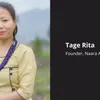This teacher from Meghalaya aims to take Ahimsa silk to the world
Meghalaya teacher Iaishah Rymbai founded EriWeave, a venture that is training village women in the art of Eri silk weaving. Also known as Ahimsa or peace silk, this fabric is processed without killing the silkworm.
In December 2018, Iaishah Rymbai, a school teacher in Raid Iapngar, a village in Meghalaya, received an order for 50 Eri silk scarves.
Hailing from a weaver family, Iaishah learnt the art of Eri silk weaving from her mother Prissila Rymbai.
To fulfil the order, Iaishah would need the help of villagers, especially women. She went from house to house in the village to encourage women to learn the art of weaving Eri silk, since the raw material for the yarn was widely available in the area.
“As years went by, the traditional art of the Eri silk weaving began to take a backseat. People became interested in other professions and soon only a handful of people knew how to spin and weave,” Iaishah tells HerStory.
People were sceptical when she encouraged them and even accused her of benefiting from it. It was challenging to help them understand that reviving the dying art would give them a continuous and consistent source of income.
She approached the Raid Iapngar Handloom Weavers Cooperative Society to discuss ideas and ways to promote the art. Soon, they were able to enrol a group of women, who were then trained in spinning and weaving Eri silk.
After fulfilling the order, Iaishah’s initiative to popularise Eri silk took off, in right earnest.
A peaceful silk

A scarf from EriWeave
Interestingly, Eri silk differs from other silk because it’s non-violent, vegan and also known as Ahimsa silk, as it’s processed without killing the silkworm.
Eri silk is extracted from the Samia Cynthia Ricini moth or Philosmia ricini moth that is fed castor or cassava leaves. The cocoons are boiled after the moths emerge so not a single silkworm is killed.
“It’s an all-weather fibre that keeps you cool during summers and warm during winters and is gentle on the skin. It can used in knitting, crochet, and embroidery,” Iaishah says.
A teacher by day, Iaishah teaches mathematics in an upper primary school. A handloom weaver and entrepreneur in her after-school hours, Iaishah is determined to take her Eri silk brand, , to all corners of the world.
“Along with my education, my mother was also insistent that I learn our traditional art and craft, especially Eri silk weaving,” she says.
She invested Rs 20,000 from her own savings, and with another Rs 30,000 received in the form of donations from friends and family, Iaishah started her unit with looms inherited from her family.
“We had around five to six weavers in my family, and my mother still weaves when she finds the time. So, it was not too difficult to start off,” she says.
The EriWeave products, comprising scarves, stoles, and fabric are sold via online channels, including Facebook and Instagram. They are also available on their website, eriweave.in.
Prices range between Rs 2,500-3,000 per metre.
Eyeing a global market

Women at work
In 2020, Iaishah applied to and was selected as part of the 50 entrepreneurs of PRIME (Promotion and Incubation of Market Driven Enterprises) Cohort 2.0, the Meghalaya government’s resource-intensive initiative to encourage a startup ecosystem in Shillong.
This will enable EriWeave to be incubated in the capital and take its silk to the world.
Elaborating on the PRIME programme, Conrad Sangma, Chief Minister of Meghalaya, said, “In line with our vision of improving livelihoods without comprising on sustainability and preserving our traditions, we are moving a step ahead and ensuring that entrepreneurship at grassroots levels is encouraged, promoted, and motivated through our PRIME programme. This includes special focus on promoting women entrepreneurs; and as a testimony, we have several success stories emerging from our startup and entrepreneurship initiatives.”
Iaishah believes incubation at PRIME will help her scale the business, engage more women, and raise funds because there is a demand for the products. She is also happy with the training, mentorship, and support received.
She recently attended the World Expo in Dubai and is looking at the UAE as a market.
Since the silk is handmade, the process is time-consuming. Iaishah also finds it difficult rope in more hands. That’s slowly changing as women realise that they can earn around Rs 15,000 a month from spinning or weaving, and are learning the benefits of financial independence.
Currently, she has 10 permanent women weavers on her team and 70 spinners. They buy cocoons from silkworm rearers; this is given to spinners who separate the yarn, after which weavers take over to make silk.
She admits entrepreneurship is a difficult path to tread.
“As a woman and a mother, I have to manage my time between my job as a teacher, my business, and the family. It’s difficult sometimes but efficient time management helps,” she says.
“I'm dreaming of the day when our products will be available in the global market,” Iaishah signs off.
Edited by Teja Lele



1553156987557.png?fm=png&auto=format&h=100&w=100&crop=entropy&fit=crop)





